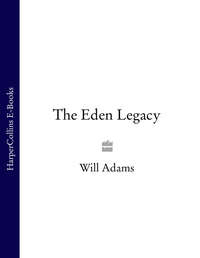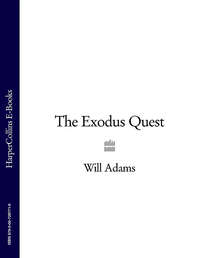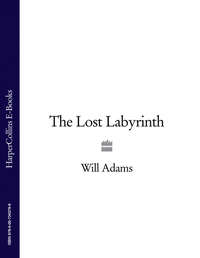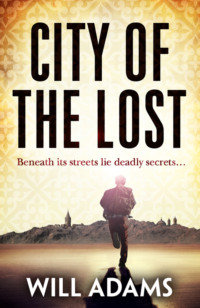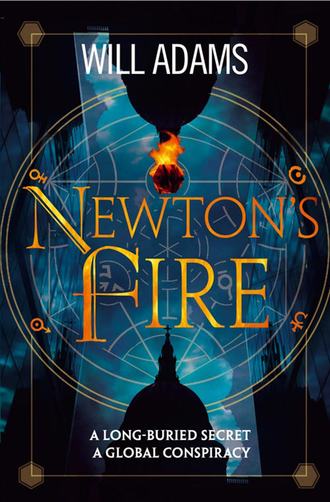
Полная версия
Newton’s Fire

WILL ADAMS
Newton’s Fire

To Jonathan and Sarah
Table of Contents
Title Page
Dedication
Prologue
Chapter One
Chapter Two
Chapter Three
Chapter Four
Chapter Five
Chapter Six
Chapter Seven
Chapter Eight
Chapter Nine
Chapter Ten
Chapter Eleven
Chapter Twelve
Chapter Thirteen
Chapter Fourteen
Chapter Fifteen
Chapter Sixteen
Chapter Seventeen
Chapter Eighteen
Chapter Nineteen
Chapter Twenty
Chapter Twenty-One
Chapter Twenty-Two
Chapter Twenty-Three
Chapter Twenty-Four
Chapter Twenty-Five
Chapter Twenty-Six
Chapter Twenty-Seven
Chapter Twenty-Eight
Chapter Twenty-Nine
Chapter Thirty
Chapter Thirty-One
Chapter Thirty-Two
Chapter Thirty-Three
Chapter Thirty-Four
Chapter Thirty-Five
Chapter Thirty-Six
Chapter Thirty-Seven
Chapter Thirty-Eight
Chapter Thirty-Nine
Chapter Forty
Chapter Forty-One
Chapter Forty-Two
Chapter Forty-Three
Chapter Forty-Four
Chapter Forty-Five
Chapter Forty-Six
Chapter Forty-Seven
Chapter Forty-Eight
Chapter Forty-Nine
Chapter Fifty
Epilogue
Author’s Note
About the Author
Also by Will Adams
Copyright
About the Publisher
PROLOGUE
St Martin’s Street, London 1713
There was singing in the French Protestant Church as Erasmus and his companions turned into St Martin’s Street, but it was evidently the last act of the service, for the doors opened as they trundled by, and the congregation began trickling out, singly, in pairs and in small family clusters, bracing themselves against the wintry night.
‘You ain’t trying to save our souls now, are you, Ras?’ muttered Johann.
‘Someone needs to,’ he retorted.
‘They will after tonight.’
Erasmus spat over the side of the cart, gave the horses a tickle with his whip, peering through the darkness for the house. When he found it, he gave the reins a tug and they came to a halt.
The congregation had already largely dispersed, chased off by the cold drizzle. The church doors closed again, leaving the cobbled street empty, dark and silent, save for the creaking boards of their own cart and the muffled revelry of Leicester Fields. He passed the reins to Johann, climbed down. His left boot splashed in a puddle he hadn’t seen, and the chill of it penetrated his sole almost at once, feeling peculiarly like fear. He scowled as he strode over to the front steps, both from irritation and the need to give himself resolve. Johann was right. For all the prestige and the fine title of the man who’d given them their orders, Erasmus didn’t like this business one bit. Too many mysteries. Too much whispering in dark corners. But it wasn’t for the likes of him to doubt knights of the realm; nor to turn down their guineas neither.
He knocked three times. Nothing happened. He banged twice more, cupped his hands around his mouth, gave a holler. Still nothing. He looked around at his companions, shrugged. Sir Christopher had been adamant there would be someone here. He called out again, and finally he heard something inside. Bolts were drawn; hinges creaked. The door opened to reveal a portly, elderly man of middle height with unkempt grey hair down to his shoulders. He was dressed in black and he was holding a five-branched candelabra, so that tiny sparks of light reflected from his dark eyes. ‘Sir Christopher’s men, I take it,’ he said.
‘He said you had something for us to collect.’
‘Did he tell you what?’
Erasmus shook his head. ‘No, sir. Only that it would need ten of us.’
‘At least ten. If you’re strong.’
‘We’re strong enough.’
The old man stared at him for several moments. It made Erasmus feel like a whipped child. Despite the chill of the night, a bead of sweat trickled from his nape down his back. ‘Where’s Sir Christopher now?’ he asked.
‘Waiting, sir. With his son.’
‘Then how can I trust you’re who you say you are? Did he give you a token to show me?’
‘No, sir. Not a token. A word.’
‘What word?’
Erasmus scratched his throat. There’d been a lot to remember this evening, and memory had never exactly been his greatest strength. ‘The word was Polanus,’ he said.
‘Polanus?’
‘Yes, sir. Polanus. Or Bolanus, maybe. Balanus.’
The old man gave the first hint of a smile; though no more than a hint. ‘Close enough, I suppose.’ He glanced across at the cart. ‘Your men won’t be much help over there, will they?’
Erasmus beckoned them over. ‘Come on, lads. Work to do. Fees to earn.’
‘Have them wipe their boots,’ said the old man.
He led the way along a passage flanked by open doors, his candlelight offering brief glimpses of desks and tables strewn with papers, mirrors that stretched and shrank, dark oak-panelled walls with curtains red as slaughterhouses. Erasmus raised an eyebrow at Henry. For sure, they’d crack some jokes about this later, fortified by an ale or two; but right now he didn’t feel much like laughing.
They passed out the back of the house. The old man unlocked and opened a cellar door, releasing a draught of foul-smelling air. He didn’t even seem to notice, just went straight on down, taking the candlelight with him. They looked hesitantly at each other. It was absurd to be scared of an old man and his cellar; yet scared they were. Something here wasn’t right. Something wasn’t of this earth. The smell of it, sulphurous and evil, like a gateway to hell itself.
Erasmus shook his head at himself and his companions. He steeled himself and led the way. The cellar surprised him. From its stink, he’d expected something rotting and damp; but actually it proved clean and dry. The stench had to be coming from the jars, bottles and flasks that were crowded on the worktables and shelves, filled with colourful powders and liquids; or perhaps from the cold ashes of the great furnace against the far wall. But it was to the left-hand wall that the man went, to three oak chests lined up against it. He rested his hand on the largest, a little over five feet long, maybe three feet wide and high. It had four brass handles along either side for carrying, another pair at either end. But it had no obvious hinges, lock or lid, no way to open it.
‘Is this it, then?’ asked Erasmus. ‘These three boxes?’
‘These three boxes,’ agreed the old man. He smiled at Erasmus’s companions, hanging back at the foot of the steps. ‘Come now, gentlemen,’ he mocked. ‘We’re not scared of a few boxes, are we?’
Simeon came across, lifting his chin defiantly. ‘Ten of us?’ he asked. ‘Just for these?’
‘Try lifting it,’ suggested the old man.
Simeon nodded. He was short of stature, but he had broad shoulders and monstrously powerful arms. He took hold of the brass handles and heaved it up, raising it barely an inch from the floor before dropping it again and rubbing his palms ruefully on his breeches. He turned to Erasmus. ‘Hell’s teeth,’ he said. ‘So that’s what you did with your missus.’
Laughter settled their nerves. They clustered around the chest, took a handle each. When they were all braced, Erasmus gave the word and they lifted it up together, shuffled it over to the foot of the steps before setting it down again with a dull thump that sent shivers through the floor, shook dust from the walls. They stood there, massaging their backs and flexing their sore fingers, looking with dismay at the steep steps that faced them.
‘In the name of Christ,’ said David, staring balefully at the chest. ‘What’s in this thing?’
The old man smiled, as though he’d been hoping someone would ask. ‘The end,’ he said. ‘Or the beginning of it, at least.’
They looked at each other with bewilderment, but it was Erasmus who voiced their shared thought. ‘The end of what?’ he asked.
The old man’s smile broadened. ‘Everything,’ he said. ‘The end of everything.’
ONE
I
A country house attic, Suffolk, England, Sunday June 5th
Luke Hayward was lifting a stack of documents from the cardboard box when he glimpsed the sliver of sepia paper about two thirds of the way down. It looked altogether more intriguing than anything he’d seen so far. Stiffer and older and with a fractionally compressed edge, as though it had been cut by a blunted guillotine. His heartbeat accelerated slightly; but only slightly. Experience had taught him not to get his hopes up at such faint hints of promise.
He put the stack down on the dust sheet, lifted off and set aside the top half, then a bit more, exposing the front of a faded manila folder on which someone had scrawled S.I.N. in smudged black ink. His heart gave another kick, more pronounced this time, more warranted. His mouth was dry, he realized; he swallowed some saliva then paused to wipe his hands, deliberately taking his time. If disappointment awaited him, as surely it did, he could at least defer it a few more moments.
He crouched down, lifted up the front flap of the folder with his index finger, pulling the sheet with it a little way, too, as though glued to it by habit; but then he lifted the flap further and it released with a faint whisper and fell back and outwards; and Luke froze for a moment, staring down at it in disbelief.
Six months he’d been hunting. Six months. Yet not once in that time had he ever truly thought he was going to find anything. Not truly. Not in his heart. Not if he was honest with himself.
But he’d have recognized that handwriting anywhere.
He set the flap back down, rose to his full height, took a pair of white cotton archivist’s gloves from his pocket and pulled them on over his fingers like a surgeon prepping for an operation. He smoothed the dust sheet out over the attic floorboards, brushed away some dust and grit of fallen plaster, then opened the folder all the way. There were four sheets of the paper, he could now see, not just one. He fanned them out a little. Each bore the tell-tale creases of once having been folded into quarters and slit along one edge to make a miniature notebook, much as he’d sometimes done himself as a child, playing at being a spy. Almost certainly alchemical papers, then, for it had been one of the great man’s quirks to dedicate such notebooks to his alchemical studies. But the sheets had been unfolded many years ago, and the decades spent weighted down near the foot of this tall stack of papers had pressed them flat.
It was too gloomy here for Luke to read. He carefully picked up the top sheet, took it to the nearest window. The light was better here, but still not ideal, for the panes were small, dirty and obscured by fingers of ivy. Besides, the writing had blurred and faded a little over the centuries, perhaps from these less than ideal conditions, exposed to extremes of heat and cold and damp. Add to that the characteristic tightness and closeness of his handwriting, and the arcane subject matter of the text, and it took Luke a good two minutes just to make sense of the top three lines.
Saturn will put into your hand a deep glittering mineral wch in his mine is grown of first matter of all metals. If this mineral after its preparation wch he will show until thee is in a strong sublimation mixed, with three parts
The passage stopped abruptly mid-sentence. Beneath it, though upside down, thanks to Isaac Newton’s quirk with the notebooks, was a citation from St. Didier’s Triomphe Hermetique, one of the alchemical texts the great man had most admired. It had been published in 1689, if Luke’s memory served, though Newton hadn’t got hold of his own copy until 1690. Luke held the sheet up to the window again. When he squinted hard at the paper itself, he could just about make out a watermark: a horn at the top, the capitalized letters IR beneath it. He knew the paper well. Newton had bought a large stock of it in the mid 1680s; had used it, on and off, until around 1695. Put together with the Saint-Didier citation, it dated this paper to first half of the 1690s; most probably from autumn 1692 to late 1693, the most intense period of alchemical experimentation and study in Newton’s life.
Luke’s hand was trembling a little, he noticed. As an academic specialising in the Scientific Revolution, he’d seen thousands of pages of Newton’s handwriting and annotations over the years; and many hundreds in the past year alone, when dismissal from the university had given him the time to begin the research for his long-planned biography. But none had affected him quite like this, for they’d all been in libraries and museums and private collections. They’d all been known about, studied, debated.
But this was new. This could be anything.
He turned the page over. Again the patchwork writing, passages in English, French and Latin. It had been Newton’s practice, when studying any new field, to read the acknowledged authorities in it, preferably in their original language, copying out any passages that particularly caught his eye. Luke recognized a citation from Philatheles and two lines from the Emerald Tablet, but otherwise the extracts were unfamiliar.
He returned the page to its folder, picked up the second sheet, hesitated. He’d promised Penelope Martyn he’d let her know at once should he find anything. He also needed to photograph these pages and email them to his client’s lawyer. But he couldn’t resist another quick look. This sheet too was filled with alchemical passages; but there was something else overleaf, something different: four words scrawled so fiercely near its foot that Newton had evidently damaged his quill while doing it, for the ink was thick and blotted.
Fatio O my Fatio
He set the page carefully down, conscious of a warmth in his throat and cheeks, flushing slightly with vicarious embarrassment, as though he’d walked in by accident on someone’s private shame. And, just for a moment, he felt uncertain what to do.
No. That wasn’t quite true. He knew exactly what he was going to do.
It was just that he felt wretched about doing it.
II
The Amalfi coast road, Italy
Vernon Croke could sense Irina struggling to maintain her silence as they wended the sharp, high hairpins just fast enough for their tyres to screech on the sun-baked roads, for she knew better than to question his tactics or to imply criticism, especially in front of other people, even if only his driver Manfredo. But they had to drop by the villa to pick up their things before heading on to Naples airport, and when they were safely inside he decided to let her off her leash.
‘I didn’t know you spoke German,’ he said.
‘I don’t,’ she said. ‘Honestly, I don’t. My grandmother lived in the Black Forest. I stayed with her sometimes. I’m sure I told you about her.’
Croke smiled reassuringly. ‘So you got the gist, then?’
She nodded twice. ‘I don’t understand,’ she said, with a curiously plaintive indignation. ‘How could you do business with such a man?’
‘You mean, how could we do business with him?’ He went to the bar to fix them each a Bloody Mary. ‘Very easily, my dear. He happens to be exceedingly rich.’
‘And you’re not?’
Croke shrugged. It was true that he lived rich, what with the villas and cars and the private jet; but those were the necessary trappings for his kind of business, and most were rented. But he couldn’t say that without ruining the illusion; nor could he exactly hold Irina’s reaction to their recent meeting against her, for fastidiousness was one of the qualities he liked her for. And their recent host had been one of the more repellent men Croke had ever met, bloated and pale, and glistening with expensive scents that couldn’t quite disguise the noxious smells beneath, like so much bleach poured into a toilet. He’d kept glancing hungrily at Irina throughout their meeting, licking his lips as if she were the last pastry on the plate. And then, after uncapping his fountain pen and seemingly poised to sign the contract, he’d paused, looked up at Croke and had switched to German. ‘Your assistant keeps smirking at me,’ he’d said.
‘I’m sure she doesn’t.’
‘She’s been smirking at me this whole meeting.’
It had been the first time Croke had met his host, but he was familiar with the type. Deny the accusation, he’d protest about being called a liar, and then it would be a matter of face; and you never knew where you stood with such men on a matter of face. ‘Irina is young and new,’ he’d therefore replied, in his most emollient German. ‘I’m sure she meant nothing by it. I’m sure she’s extremely sorry for the offence she has given.’
‘I don’t like women who smirk.’
‘What man does?’
‘She needs taking in hand. That’s what she needs.’
Croke had nodded. ‘I’ll see to it as soon as I get her home.’
‘I’ll see to it for you,’ said the man. ‘Consider it my gift. To celebrate our deal.’
Croke had glanced sideways. The faint sheen on Irina’s forehead had been his first hint that she could speak German after all. He’d turned back to his host.
‘Call me superstitious,’ he’d said, ‘but I never celebrate a deal before the ink’s dry.’
‘Call me superstitious,’ his host had returned, ‘but I never make a deal unless I have a bottle of champagne on ice.’ And he’d looked around at his two bodyguards at that moment: nothing dramatic, just enough to put them on alert.
Irina had been with Croke since the debacle in Doha. She’d proved attentive, smart, discreet, loyal, quick to learn and fun to bed. Everything he could have asked. On the other hand, his safety was now at stake; not to mention a potentially lucrative relationship.
‘Well?’ his host had pressed, pen poised above the dotted line. ‘Do we have a deal?’
Something unfamiliar had fluttered inside Croke’s chest at that moment; and he’d realized, not without a certain perverse pleasure, that it was fear. It was an unexpected drawback of success, that it allowed you to cut risk out of your life. But risk was excitement; risk was joy. So he’d looked unflinchingly up into his host’s gaze. ‘Go fuck yourself,’ he’d said.
A pinch of garlic salt in the Bloody Marys, a dash of Tabasco, ice cubes and a slice of lemon. He was a traditionalist when it came to drinks. He took the heavy crystal tumblers over to Irina, gave her hers. She took a large swallow. Her eyes gleamed and her jaw muscles tightened. ‘You considered his offer,’ she said bitterly. ‘I saw you considering it.’
‘I considered the situation,’ he said mildly. ‘It’s not the same thing at all. Besides, if it makes you feel better, it wasn’t about you.’
She snorted at that. ‘It felt like it was about me.’
‘I’m sure it did. But it wasn’t. If it had really been about you, he’d never have signed the contract. We might not even have got out of there alive. It was about me. Specifically, he wanted to know if he could trust me, or whether I was the kind of man who could be bribed or bullied into giving up something I valued.’
‘I thought you were going to say yes,’ she said, the slight quaver in her voice betraying the way her world had trembled beneath her feet. ‘I thought you were going to give me to that … that monster.’
‘But that’s the point,’ said Croke. ‘It wouldn’t have been a gift. Not under coercion like that. It would have been tribute.’
She took another gulp, frowned and shook her head. ‘I don’t see—’
‘Tribute is something demanded by the stronger party and paid by the weaker,’ explained Croke. ‘I don’t pay tribute. I never pay tribute. It sends all the wrong signals. It lets people know you can be pushed around. Gifts, on the other hand, are what equals exchange freely and willingly. They’re a valuable part of what I do; they’re how I form bonds with other powerful people, how I build my influence. Here’s a tip for you: in situations like this morning, where you find yourself at a temporary disadvantage, do whatever you can to achieve parity first, and only then show generosity. Otherwise it will be misinterpreted as weakness. Do you understand?’
She sat a little heavily down in one of the white leather armchairs. ‘My head,’ she murmured. ‘I don’t feel so good.’
‘A reaction to the tension, I expect.’
‘Yes.’
‘Or perhaps to what I put in your Bloody Mary.’
She frowned a moment then looked in dismay down at her drink. But it was already too late. She tried to push herself up but collapsed back down again.
‘You really should have let me know you spoke German,’ he told her. ‘I need to be able to trust the people around me.’
She tried to say something, maybe explain herself, but nothing came out. The tumbler slipped from her weakening grasp and shattered on the polished marble floor, tomato juice spreading like blood around the translucent shards. Her eyes glazed and her head lolled forward, a little pinkish drool leaking out onto her white blouse.
The door banged open, Manfredo and Vig sprinting in, handguns already drawn, alarmed by the tinkle of breaking glass. ‘It’s all right,’ Croke assured them. He nodded at Irina, slumped unconscious in her armchair. He turned to Manfredo. ‘Take her back to our friend from this morning, would you,’ he said. ‘Tell her she comes with my compliments, to celebrate our deal.’
Manfredo holstered his gun. ‘Yes, sir. And afterwards?’
‘Meet us at the airport. We wouldn’t want to miss our slot.’
‘No, sir. Anything else?’
Croke knocked back the dregs of his Bloody Mary, set his glass down on the counter. ‘Yes,’ he said. ‘You’d better call Francesca in Geneva for me. We should probably let her know I’ll be needing a new assistant.’
TWO
I
‘You found them,’ said Penelope Martyn in an awed murmur, when Luke tracked her to her kitchen. ‘I don’t believe it.’
Luke allowed himself a smile. ‘I don’t either,’ he admitted.
‘And? Are they … are they what you were hoping?’
He didn’t quite know how to answer that. Her house was grand but badly rundown; and he’d got the distinct impression, when they’d chatted earlier, that a windfall would be more than welcome. ‘They’re alchemical papers,’ he said carefully. ‘Four sheets, written front and back. Citations from other authors, as far as I’ve been able to tell.’



